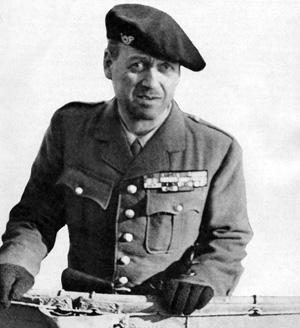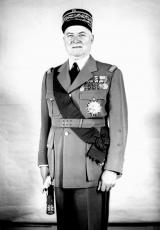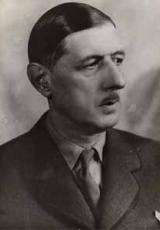Antoine Béthouart

(17th December 1889: Dôle, Jura - 17th October 1982: Fréjus, Var)
Antoine Béthouart came from a family from Marquenterre in Picardy, and studied for his baccalaureate at Sainte-Geneviève in Versailles, enrolling at Saint-Cyr in 1909 in the class known as "Fez ", where he would meet Alphonse Juin and Charles de Gaulle. In October 1912, as sub-lieutenant, he was posted to the Vosges to the 152nd infantry regiment (RI) and served in various units before joining the 158th RI where he distinguished himself during the First World War in the Alsace, at Verdun, in the Somme, on the Chemin des Dames and during the attack on Mont Kemel. Wounded on three occasions, he was awarded numerous citations and ended the war with the rank of captain. Between 1919 and 1920, he was assigned to the Finnish army at Viborg, before being admitted to the Ecole de Guerre and serving, from 1922 to 1924, at the headquarters of the 12th army corps and the 6th battalion of alpine chasseurs. Promoted to Head of Battalion in March 1928, he commanded the 24th battalion of alpine chasseurs at Villefranche. Appointed deputy to the French military attaché in Yugoslavia in 1931 and then promoted to Lieutenant-Colonel in 1934, he carried out this diplomatic role in full until 1938.
In September 1939, Colonel Béthouart, at the head of the 5th half-brigade of alpine chasseurs (Chambéry), was responsible for the border along the Alps, before returning to the Maginot line in the Moselle sector of Bitche. In February 1940, he formed the High Mountain brigade with a view to operations in Scandinavia. The corps of troops set off on the 12th April. As a result, its founder was awarded his Brigade General's stripes. After Bjervik, on the 28th May his men took Narvik, pushing back the German battalions of General Dietl to the border, a feat which would earn him promotion to the dignity of Commander of the Légion d'honneur. The French expeditionary corps to Norway was partially evacuated to the United Kingdom following the armistice. Béthouart remained faithful to his unit, following those of his men who wanted to return to France. He was finally repatriated to Morocco where in turn he took command of the Rabat subdivision, the presidency of the French Armistice Commission in Morocco and then command of the Casablanca division in January 1942, a strategic position where he organised assistance to the Allies during the November landings. He was arrested by the President General, Noguès, and on the 10th November appeared before a court martial in Meknès where he was sentenced to death. Freed a few days later, he was promoted to Division General and in December 1942 he was appointed Head of the Military Mission to Washington by General Giraud in order to negotiate the American government's practical aid for the French army. As Chief of Staff of the national defence in Algiers, he brought about the close relationship between the FFL and the African Army, accompanying General de Gaulle to Rome, London and Bayeux. In August 1944 he was commander of the 1st army corps, fighting with the 1st army in the Belfort Gap (14th November), taking Héricourt, Montbéliard, Delle and reaching Mulhouse; he is cited on the order of the army. On the 29th January 1945, during operations to close the Colmar Pocket, he upset the German fortified defences on the southern front and succeeded in joining up with units of the 1st army arriving from the North. He reached the banks of the Rhine on the 9th February; he was then promoted to the dignity of Grand Officer of the Légion d'honneur. During the German campaign, he took Constance, Ulm, Friedrichshafen and Bregenz, finishing his epic journey in the Arlberg Pass (Austria) on the 6th May 1945. Rising to Companion of the Liberation, General Béthouart was appointed High Commissioner of the French Republic in Austria on the 8th July 1945, remaining in this role until the 30th September 1950, having left active service with the rank of Army General on the 12th January 1949.
On returning to France, he held the presidency of the Committee of the Flame under the Arc de Triomphe and of the European Federation of Servicemen's associations and continued to serve France as a member of parliament. In 1955 he represented the French in Morocco and, from 1959, French citizens overseas in the Senate, also being appointed member of the commission for foreign affairs, defence and the armed forces. On the 2nd and 3rd June 1958, he voted for full powers for General de Gaulle and for constitutional reform. In 1960, he voted for the act authorising the government to take the necessary measures for maintaining order in Algeria. The following year, he participated in discussions on aid to those repatriated from North Africa. From1963 to 1971, he was a spokesman for the Commission for Foreign Affairs on the Ministry of Foreign Affairs' government finance bill for credits, making observations on numerous subjects including technical cooperation, the position of French nationals overseas (1963), compensation for farmers despoiled in Morocco (1964), the repatriated (1966), military aid credits for the countries of North Africa, diplomatic personnel and positions (1967), credits for cultural activities, the performance of the Upper Council for French citizens overseas, the posting of military conscripts (1969), the French Alliance, military aid to Algeria and the situation in Cambodia (1970). In June 1970, he was a member of the special commission charged with examining the government bill regarding compensation for repatriated French citizens. As Vice-president of the French delegation to the NATO parliamentary conference in 1965 and 1968, Béthouart spoke in public sessions in the Senate in 1966 and 1967 on the question of relations between France and the Atlantic Alliance. He also took responsibility for questions about the reform of the French army, took part in the debate on national service in 1965, on the army's health service in 1968 and, in 1970, on the government bill regarding military facilities for the period from 1971-1975. He retired in 1971 to pursue a career as a writer, starting with La Bataille pour l'Autriche (The Battle for Austria)(1966) and Cinq années d'espérance (Five years of Hope) (1968). He published Des hécatombes glorieuses aux désastres (From Glorious Bloodbaths to Tragedies) (memoirs) in 1972, followed by Le Prince Eugène de Savoie (1975) (Prince Eugene of the Savoie) and Metternich et l'Europe (Mettenich and Europe) (1978), alongside regular contributions to Le Figaro. General Antoine Béthouart died on 17th October 1982 in Fréjus and is buried in Rue, in the Somme.



